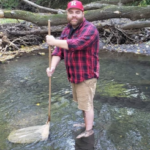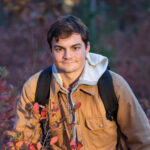 At the 2020 Virtual Annual Meeting of the Entomological Society of America (ESA), held November 11 to 25, several Rutgers School of Environmental and Biological Sciences entomology students won awards in the student paper competition for the President’s Prize. Each year during the ESA Annual Meeting, students are offered the opportunity to present their research. The President’s Prize is granted for graduate and undergraduate students for their 10-minute oral presentations, posters, and infographics.
At the 2020 Virtual Annual Meeting of the Entomological Society of America (ESA), held November 11 to 25, several Rutgers School of Environmental and Biological Sciences entomology students won awards in the student paper competition for the President’s Prize. Each year during the ESA Annual Meeting, students are offered the opportunity to present their research. The President’s Prize is granted for graduate and undergraduate students for their 10-minute oral presentations, posters, and infographics.
This year’s annual meeting was conducted virtually, and the students adapted accordingly. Doctoral student Chelsea Abegg said “Attending the ESA conference virtually meant that I was able to watch ALL of the talks on my own time without missing a thing! If I had attended the conference in person, then I would have had to choose between some talks and would have missed out on some research that I was interested in.” For graduate student Mike Monzon this meant that he could forgo the loss of income and cost of travel by attending virtually.
Abegg, a doctoral student in professor Cesar Rodriguez-Saona’s laboratory interested in the impact of pesticides on honeybees, won first place in the Plant Insect Ecosystems – Pollinators 1 section for her talk on “The effects of blueberry & cranberry pest management practices on Apis mellifera hive health.” She is interested in the effects of pesticides on pollinators. New Jersey depends on honeybee pollination services for a variety of sustainable crops and the honeybees providing these services have shown a decline in health over the last decade. “My research takes a field and lab approach to study how fungicides impact honeybees at every stage of life. I hope to identify the causes of their health decline, establish mitigation strategies to improve honeybee health, and increase honeybee pollination to provide our growers with higher yields,” said Abegg.
Kasia Madalinska, a graduate student in associate professor Anne Nielsen’s laboratory, won first place in the Plant Insect Ecosystems – Extension and Outreach section for her talk on “The use of egg mass distribution as an early detection tool for the presence of Lycorma delicatula the following year in vineyards.” Madalinska works on host plant preference of the Spotted Lanternfly, a newly invasive species in New Jersey. “Studies on host plant preference help guide my research looking at behavior and management tactics to protect our wine grape industry,” said Madalinska.
Michael Monzon, a graduate student in department chair George Hamilton’s laboratory, won first place in the Medical, Urban and Veterinary Entomology – Forensic Entomology and Muscoid Flies section for his talk on “The high temperature thermal biology of a central New Jersey population of Phormia regina under laboratory conditions.” Monzon’s main interest is the application of the principles and techniques of forensic entomology to investigations of the past, such as archaeological studies. Monzon said, “Due to COVID19 I had to choose a thesis project that I could do by myself in the lab,” so he switched gears to focus on high temperature thermal biology of the forensically important blow fly Phormia regina.
Timothy W. Schwanitz, an undergraduate senior pursuing dual degrees in Entomology and English and doing research with assistant professor Chloe Hawkings and Rodriguez-Saona, won first place in the Biochemistry, Physiology and Toxicology – Undergraduate General section for his talk on “Transcriptome analysis of Drosophila suzukii winter and summer morphs identify differences in olfactory related genes.” Schwanitz was also the recipient of the 2020 BioQuip Undergraduate Scholarship. His research is focused on insect behavior, especially the behavior of the invasive fruit fly Drosophila suzukii. Schwanitz hopes to pursue graduate programs that focus on the intersection of neuroscience, biology and behavior. He commented, “Insects are an excellent study group because of the countless different species and almost unimaginable different life strategies. Insects are smaller and easier to work with, and yet many of the fundamental lessons from invertebrate nervous systems have revolutionized our understanding of all nervous systems.”
The students noted the importance of attending national meetings for their career goals, and of the SEBS Department of Entomology in helping them succeed. Abegg, who hopes to have her own honeybee research lab one day said, “It’s important to attend the ESA conference because it is full of entomologists sharing their work. During this meeting you have the opportunity to network for future jobs, collaborate in research, and discover new methods for conducting more efficient experiments and winning a national award felt surreal and the excitement only grew as I realized that all of my hard work had not only paid off but it meant something to others as well. Having won a national award is going to look great on my resume and I believe that this recognition will improve my chances to receive grants for future research.”
Madalinska, who hopes to work in extension said, “ESA provides individuals with a snapshot of what other labs in other universities are working on. It gives you an opportunity to explore avenues and research that might otherwise fall under your radar due to your own research specialization. It gives you the ability to meet individuals and make countless connections.” She also noted the valuable support she received from the department. “Other than the support of my advisor and the lab, the department has been instrumental in assisting me in my goals. We have a small department which is culturally diverse and has a copious amount of research topics and sub disciplines. Everyone in the department is extremely available and helpful to the students in the department.”
This support provided aid for Monzon who also attended Rutgers for his undergraduate degree. He noted “The Department of Entomology at Rutgers has been integral in my success. By this point I have taken a class or have been evaluated in some form by just about every faculty member and incorporating the input of so many accomplished scientists has helped me progress. Our department hosts a Student Summer Colloquium which is our internal mini-ESA where students can debut their talks. For the entire month of October our weekly lab meetings largely revolved around ESA prep which I believe is a large reason I ended up winning.”
Schwanitz, who is an undergraduate student attending ESA said “The Entomology Department at Rutgers offers almost limitless chances to gain hands-on research experience. In just four years of undergraduate study. I’ve worked with four separate professors in multiple disciplines. I got to chase dragonflies in New Jersey’s northern bogs, and I got to work with blueberry pests in the Pine Barrens. My experiences in urban entomology showed me the power of research to improve human quality of life, especially for low income communities that don’t always have access to safe and effective pest control. Research opportunities should form the core of a science education. The Entomology Department provides plenty. Plus, the Department boasts good classes, caring professors, and the coolest subject imaginable.”





